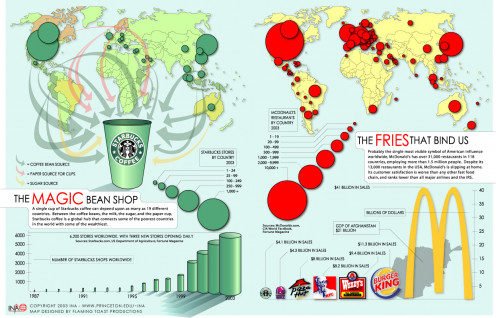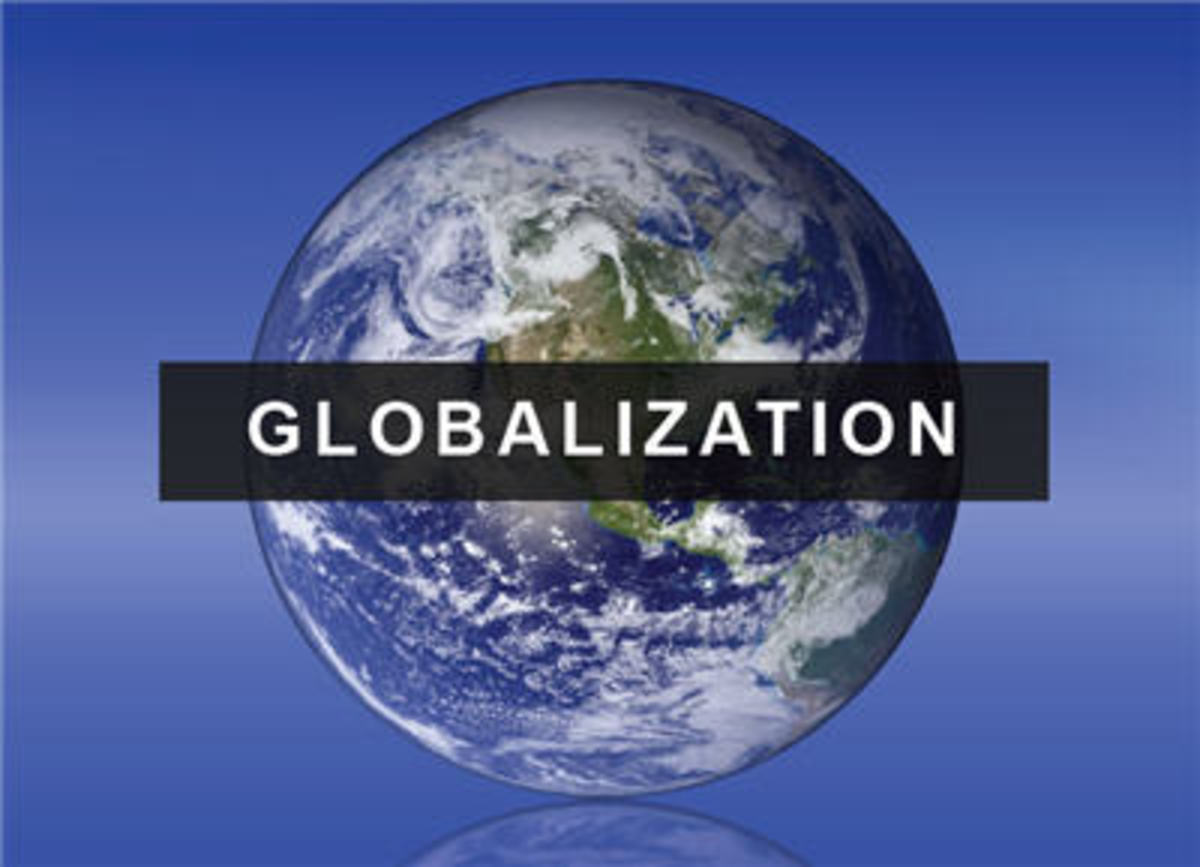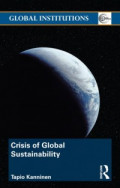Olive Trees, Golden Arches & the Real Effects of Globalization
Globalization's Golden Promises:
They Were the Best of Times...
Few books on the market, even today, have been able to define the tenets of globalization as well as Thomas Friedman’s fifteen-year-old publication, The Lexus and the Olive Tree. Written at a time when the modern explosion of neoliberalism and the creation of new trade treaties first shifted social, political, and economic landscapes around the world, Friedman’s work helped to explain the ideology driving the rapidly changing and often confusing New World Order of the post-Cold War era in layman’s terms. However, this isn’t to say that Olive Tree, although clear and compelling, isn’t biased as well; there is no doubt that the book not only advocates globalization, but glorifies it to boot.
To be fair, the most important thing to remember when reading Olive Tree is that it was written in 1999, before the attacks on 9/11, before the global financial crisis of 2008. A lot has changed since then, and the pro-neoliberal argument is becoming ever more difficult to merchandise in the face of its dire repercussions. Curiously, although more recent editions have been slightly revised to accommodate the events since its first release, Mr. Friedman steadfastly maintains his original tone – that globalization is here to stay, and that essentially, this is a good thing. In order to come to this conclusion Mr. Friedman spins the devastating effects of globalization and focuses instead on the wealth that neoliberalism has created, while blithely ignoring where that wealth is allocated, and at what cost. Nonetheless, despite Mr. Friedman’s enthusiastic pro-U.S., pro-globalization pitch, the truth is that in 2014, the detrimental ramifications of neoliberalism have become too numerous, too deep, and too extensive to overlook. The Lexus and the Olive Tree is best understood in context; a heady, enthusiastic tome on globalization at a time before its effects began to be more fully realized.
The "Electronic Herd" Mentality
Friedman explains that the post-Cold War era is distinguished by the speed of connectivity and integration of people and systems; according to him, the world would no longer be defined along the lines of the “Global North” and the “Global South,” but along the lines of ‘fast’ or ‘slow’. While “walls” defined the Cold War era, “webs” define the globalized era, images and terms that succinctly illustrate the core postures of each period. Friedman also points out that the globalized system rests on three specific balances – the traditional balance between states; the balance between states and global markets; and the balance between “super-empowered” individuals and states. Technology has empowered individuals to spread their messages and ideologies far and wide, and has given them a tool with which to gather and mobilize like-minded people to advance their causes; but of course, the reality is that not all individuals have access to the technology that would fully democratize the freedom of choice that Friedman contends is the inheritance of those living in the globalized era. Likewise, technology and the removal of trade barriers has nurtured the creation of what Friedman calls the “Electronic Herd,” the sum total of über-wealthy global investors who manage their transactions electronically, and who, according to Friedman, have become the harbingers of progress and the “creative destruction” of capitalism that ensures that less efficient products and services are abandoned and replaced with new, more productive, and more desirable counterparts.
Speak Out, America!
Has Globalization helped or hurt the world economy?
Rule by Corporation
Although this all sounds good in theory, in practice, it has had some alarming side effects. The truth is that the neoliberal trade policies that have granted this aggregate of wealth the freedom to enter and exit the market at will, easily and quickly, has left states greatly at the mercy of the market; citing the power of the “Herd,” Friedman reminds his readers that it was the market that ousted Suharto in Indonesia in 1998 when the “Herd” withdrew its support for the Indonesian economy. While Friedman champions this ability of the market in the globalized era, regulatory capture should raise red flags of concerns for the citizens of states worldwide. What does it mean when corporations and investors decide the leaders of nations, based on how profitable those leaders’ policies are for their individual firms? That the World Trade Organization’s ‘Trade-Related Intellectual Property Rights’ (TRIPs) and ‘Trade-Related Investment Measures’ (TRIMs), as well as the International Monetary Fund’s Structural Adjustment Programs (SAPs) have greatly served the interests of transnational (TNCs) and multinational (MNCs) firms within developed nations at the expense of the social, political, and economic needs of developing nations isn’t news; we have only to take into consideration the historical effects of neoliberalism on countries throughout Latin America and Africa to understand its consequences. For example, reduced healthcare spending by the state has increased the power of NGOs in the local health systems of countries such as Guatemala, increasing the funding for these agencies while fragmenting and undermining the local control of health programs. This may seem unconnected to TNCs and MNCs, until we take into account the fact that TNCs and MNCs provide the bulk of NGO funding. In Brazil, TRIPs regulations came in direct conflict with the nation’s healthcare needs when it faced an AIDS epidemic of massive proportions in 2005 but lacked access to affordable drugs due to the WTO’s TRIPs regulations that criminalized the production of generic AIDs-related pharmaceuticals. Luckily for Brazil, the sheer size of its market and the global attention its well-publicized outrage received forced the WTO to bend its rules, but not all nations have fared as well.
Starbucks vs McDonald's

"Henry Ford was right. A prosperous economy requires that workers be able to buy the products that they produce. This is as true in a global economy as a national one." ~ John Sweeney
The United World of America?
Friedman’s Olive Tree is rife with catchphrases and euphemisms, one of the most famous being his ‘Golden Arches Theory,’ which postulates that countries with McDonald’s restaurants never go to war with each other, basically advocating the ‘Americanization’ of entire nations while disregarding the cost of mounting such an endeavor in resistant states. To his credit, a very similar argument was made pre-World War I, when President Woodrow Wilson asserted that, “The world must be made safe for democracy,” while he simultaneously deployed U.S. troops into Haiti to keep German industrialists out. Of course, this ideology was invalidated by the punitive terms of peace crafted by the victorious Allies, which fomented the economic conflicts that culminated with World War II. Similarly, the backlash from tribal nations unwilling to democratize and accept neoliberal policies throughout the Middle East culminated with the attacks on the World Trade Center on September 11, 2001 and the ensuing wars in Iraq and Afghanistan, not to mention the violent spread of Jihadism around the world, and the chaos of multiple ‘Arab Spring’ uprisings in Tunisia, Egypt, Syria, and Libya. But of course, all of these events took place after Mr. Friedman’s book was published, lauding the benefits of what he called ‘globalution,’ the theory that free market capitalism would promote democracy for all mankind.
Mr. Friedman pleasantly predicted that globalization would herald in a world in which citizenship would be based on ideas and not tribalism, but he failed to explain how this would happen “freely,” especially if leadership is chosen by a speculative “Electronic Herd.” After all, if investment capital is not a form of coercion, then what is? Friedman advocates protecting the environment from destructive policies, which ironically requires government intervention, and doing away with corrupt and thieving governments which he dubs “kleptocracies,” in order to allow the free market to function; but we should consider two cases in order to conclude whether or not this is something that globalization has been able to achieve.
Chinese "Capitalism"
Firstly, the rise of China as an economic power, which has been praised as a move towards free market capitalism, would not have been actualized without the strict control of the Chinese government over its labor force, its interest rates, and its currency, as well as its blatant disregard for environmental and social concerns. This points to a contradiction in free market ideology, which ostensibly advocates for smaller government while simultaneously depending on strong state oversight in order to attain its goals. Secondly, the worldwide 2008 financial crisis caused by the globalization of neoliberal policies resulted in the bailout of multi-billion dollar firms on the taxpayer dime, even after the predatory practices of banks and insurance companies alike bankrupted the same taxpaying citizens that were called upon to pay for the damages. If that’s not theft, then what is?
Balance Act: The Role of the State in a Free Market
The Lexus and the Olive Tree is an exemplary summation of the argument for globalization and of promises that never materialized, at least not for the vast majority of people around the world. Margaret Thatcher’s famous mantra “TINA,” once assured us that “there is no alternative” to neoliberalism; however, this is a distortion of the truth. Adjustments made to correct normal negative market externalities, such as the reinstatement of the Glass-Steagall Act, supply side policies that stress improvement and quality, and social programs that advance the skills of the labor force, are not endemic to capitalism – they sustain it. Clearly, the profits wouldn’t be as stunning as those proposed by unregulated neoliberalism, but the costs wouldn't be, either. And this is probably the greatest achievement of Friedman’s book. By clearly defining the failed promises of globalization, Mr. Friedman unwittingly presents the best argument for the revision of neoliberalism in the post-2008 era. The solutions are there; we lack only the will.
© 2014 nadia asencio









